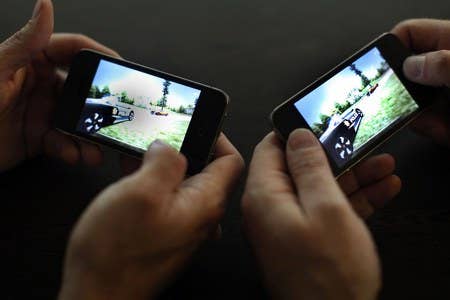Mobile Gaming USA: Big Business, Brands and Bad Games
Takeaways from this week's conference: Big business dominating the market, handsets as TV controllers and the cost of user acquisition
The Mobile Gaming USA conference last week was a gathering of executives in the mobile gaming industry along with people in associated businesses. The conference, held at the Hotel Kabuki in San Francisco, had numerous sessions dealing with a range of topics concerning the business of mobile games, from technical sessions to marketing, from branded advergames to HTML 5. Here are the highlights of the conference, presented in key quotes.
Jason Loia, the COO of mobile and social publisher Digital Chocolate, led off by providing what he thinks will be the key to hitting the next 1 billion gamers. That's a goal that's been expressed by companies like Zynga and Gree. In Loia's view, games need to be free-to-play with virtual goods, cross platform, with a simple, social game mechanic that lends itself to viral discovery and engagement. Freemium leaves money on the table, you need virtual goods to get the whales, according to Loia. He shared some figures from Digital Chocolate's experience: Their Facebook gamers all play smartphone games; loyalty is increased by 3x if you play on two platforms (such as Facebook and mobile); greater than 70 percent will pay more if they play across multiple platforms; and ARPU increases by 20 percent for players who engage across multiple platforms.
Question asked when discussing marketing: "It seems like today you have to bring $100,000 to the table to get charted [appear on the best-selling charts]. Is there any hope for viral still?" The answer from Jesse Divnich, analyst with EEDAR: "There's no hope. It worked great in the early days, but now we're seeing people complain about discovery. Marketing and cost of acquisition per user is going to rise. Independent developers thought they had broken free of that, but we are going back to the bigger companies going to dominate the mobile gaming market. If you are an independent developer and make a really great game your chance of making good money is slim to none, where a big company can make an okay game and make good money. There are now more branded titles in the top fifty than there ever were before, now closer to forty percent, and that will continue to increase."
"We are going back to the bigger companies going to dominate the mobile gaming market"
Jesse Divnich
ARM held a session to discuss advances in its chip designs that form the basis of almost all smartphones and tablets. Two of the key points made by Simon Hickman, gaming marketing manager for ARM: Expect fifty million smart TVs with GPUs to ship in 2012; the mobile ecosystem is becoming available for home entertainment. The controller issue is a big one for gaming on smart TVs; Some manufacturers are releasing their controllers with the TV, while others are looking to use mobile devices as controllers.
What is the cost of acquiring a mobile game user these days? Maria Alegre, CEO of Chartboost: "It depends on the country, it is a numbers game. People are paying between fifty cents and five dollars." Darya Trushkina, VP of business development for Game Insight: "On average, over three dollars per user is expensive. But it is changing all the time, and it is getting more expensive."
While discussing branding using advergames or putting brands into games, Sean Hurwitz, CEO of Pixofactor Entertainment said: "Good or bad, they need to be in mobile now. Whether you are Pampers or Nike or Evian water you need to think about how to get there." It's not always easy, though. Kenny Rosenblatt, CEO of Arkadium said: "You can't depend on the brand to also distribute the game. We did a game for Warner for the Vampire Diaries. They have 17 million likes on their Facebook page... We did convert a small portion of those but we had to really beg to get Warner to market to them."
"We did a game for Warner for the Vampire Diaries. They have 17 million likes on their Facebook page... We did convert a small portion but we had to really beg to get Warner to market to them"
Kenny Rosenblatt, Arkadium
A session about "taking the free out of freemium," or how to get better sales of virtual goods, brought this comment from Eyal Rabinovich, cofounder of MoMinis: "If you get people to keep the app installed for over ninety days, that is good. Fifty percent of users only play the first ten levels." Nick Bhardwaj, VP of monetization for NaturalMotion Games: "You're never going to monetize a bad game effectively." His advice: Make a great game, understand your markets, and build out the game for social design.
Other sessions had some notable quotes as well, including this from Glenn Kiladis, VP of FreeMyApps: "At Sea World they train whales, and that's what we do in mobile gaming." Discussing the future of HTML 5 in mobile gaming, Todd Hooper, CEO of Zipline Games: "I have yet to see a HTML 5 game crack the top fifty. Performance is still an issue. I am a skeptic."
As is usual at such conferences, the networking was at least as important as the sessions. One thing that was noted by an attendee: Except for a few passing references to "you have to make sure it's a great game," no one talked about game design or the nature of game play in mobile games. The focus was on business and metrics and development and new markets... but sometimes it was difficult to remember the conference was about creating products that people are supposed to have fun playing.

